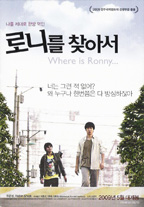

Ronileul Chataseo
South Korea 2009
Genre:
Drama
Director:
Sim Sang-kook
Cast:
Yu Jun-sang
Robin Shiek
Park Yeong-seo
Kim Ho-jeong
Ryoo Ee-hyeon
Choi Hee-won
Mahbub Alam Pollob

Where is Ronny?
Story: In-ho (Yu Jun-sang), head of a Taekwondo school, hasn't much luck lately. His school isn't going too well and his wife
considers going to work again in order for their daughter not to lack anything in life. When the neighborhood decides to form a neighborhood
watch because of the many immigrants In-ho suddenly finds himself at the front line. During a demonstration at his Taekwondo school In-ho is
then challanged by an immigrant from Bangladesh whose sales booth he tore down some days before. The immigrant floors him with one single punch.
Not just the Taekwondo teacher's pride has been wounded but from that day on he also has no students visiting his school anymore. He finds out
that the man who defeated him is called Ronny and begins to search for him. The immigrant Duhin (Robin Shiek) is supposed to help him with that, but
as they spend more time with each other Duhin tries to make friends with him.
Review: Even before "Bandhobi" this little film dealt with the topic of xenophobia in Korea. What's likeable is that the movie
by no means swings around the moral club or sits heavily on the stomach. This isn't really an arthouse flick and that's also what makes "Where is
Ronny?" so easily accessible. Yet, the movie lacks that special something. The friendship between In-ho and Duhin could have been fleshed out more and
in other respects the movie also misses some good opportunities to portray the subject in a more vivid fashion. Sadly we don't get any surprises
here, maybe except of the ending and the change In-ho undergoes. But then again, at a closer look latter one is also predictable.
In-ho's life more and more goes down the drain after he has been beat by an unknown immigrant in a duel. His Taekwondo school, who lacked students
right from the start, has no visitors at all now, his wife has to go to work again and he finds himself in a real crisis. Solving this crisis
seems to involve finding the immigrant who did all this to him. What he exactly has in mind doing with him when he found him is never told but his
search for the man is more or less to be understood in a metaphorical sense anyway. However, you can't really pity In-ho. After all, he was the one who
without any real reason attacked the immigrant days before. Even though In-ho generally may not be a bad person he doesn't seem to like
foreigners at all.
This slowly changes when he gets to know Duhin. The brash character of the immigrant starts to get on his nerves and he also has any reason to believe
that Duhin is messing around with him, but in the end it was In-ho who forced him to help him on his search for Ronny. Robin Shiek portrays the immigrant
a little bit amateurish, doesn't really look like a character in a film, but interestingly enough this makes him even the more believable as the
movie progresses since this bestows some pecularities on his person. However, the friendship that starts to evolve between him and the Korean is
presented too haphazardly. If the filmmakers had taken more time in sketching it out and wouldn't have only given it the last half hour of the movie
things would have looked different maybe.
Also, we almost get to see nothing of In-ho's family. In a few scenes we get to see his wife and daughter on screen but by that the impression that
they are getting neglected is only deepened. Furthermore, there is no special message that the movie wants to deliver either. Of course you could say
there is: xenophobia is without any base and uncalled-for, especially when it comes to Duhin who actually wants to become integrated in Korean society
but has no chance of becoming a true part of society as an illegal immigrant. Prejudices against South East Asians from poor countries also play a
part in the movie. But the film can't bring any new facets of the problem to the surface.
At least "Where is Ronny?" deals with the subject at all and just because of that it is an intersting movie. The picture surely won't reach a
wide audience and the drama also can't be considered a critics' favorite since it would need to be more pretentious for that, but that's also
one of its assets. Sim Sang-kook's debut work is a little movie that simply doesn't want to tell a great story but remains true to itself
and centers around a subject that deserves more attention. For that alone it deserves the goodwill of critics.

Disclaimer





















